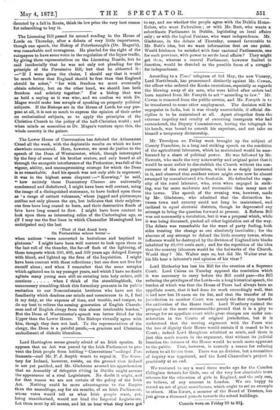The Lower House of Convocation has debated the Athanasian 'Creed
all the week, with the deplorable results on which we have elsewhere commented. Here, however, we must do justice to the ,speech of the Dean of Westminster, which, though interrupted by the fury of some of his brother orators, and only heard at all through the energetic interference of the Prolocutor, was fall of the vigour, ability, and uncompromising courage for which the Dean is so remarkable. And his speech was not only able in argument, it was in the highest sense eloquent :—" Knowing," he said, " how entirely these Damnatory Clauses are universally condemned and disbelieved, I might have been well content, using the image of a distinguished statesman, to have looked upon them as a range of extinct volcanoes,' whose jagged and picturesque outline not only pleases the eye, but indicates that their sulphur- ous fires have long ceased to burn, and their destructive floods of lava have long ceased to flow. I might have been content to look upon them as interesting relics of the Carlovingian age, as (if I may use the fine lines in which Chancellor Massingberd has anticipated me) the last 'Blast of that dread horn
On Pontarabian echoes borne'—
when nations were converted in battalions and baptised in platoons.' I might have been well content to look upon them as the last roll of the thunder, the far-off flash of the lightning, of those tempests which 300, 400, and 500 years ago deluged Europe with blood, and lighted up the fires of the Inquisition. I might have been content with these reflections ; but one does not live for oneself alone ; and when I remember that the same scruples which agitated me in my younger years, and which I have no doubt agitate many young men still on entering into holy orders, still continue when I think of the stumblingblock, the unnecessary stumbling-block this formulary presents in its public veoitation to our Nonconformist brethren who have not the familiarity which deadens our minds and consciences to it, I feel it my duty, at the expense of time, and trouble, and temper, to do my best to relieve the coming generation of English Church. men and of English clergy from this almost intolerable burden." But the Dean of Westminster's speech was better fitted for the Upper than the Lower House. The Bishops virtually agree with him, though they dare not lead. To the representatives of the clergy, the Dean is a painful puzzle,—a gracious and Christian embodiment of diabolic liberalism.


































 Previous page
Previous page